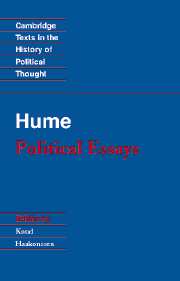Book contents
- Frontmatter
- Contents
- Acknowledgements
- Introduction
- Chronology
- Bibliographical notes
- A note on the text and the edition
- Biographical notes
- Bibliography
- Political Essays
- 1 Of the liberty of the press
- 2 That politics may be reduced to a science
- 3 Of the first principles of government
- 4 Of the origin of government
- 5 Of the independency of Parliament
- 6 Whether the British government inclines more to absolute monarchy, or to a republic
- 7 Of parties in general
- 8 Of the parties of Great Britain
- 9 Of superstition and enthusiasm
- 10 Of civil liberty
- 11 Of the rise and progress of the arts and sciences
- 12 Of national characters
- 13 Of commerce
- 14 Of refinement in the arts
- 15 Of money
- 16 Of interest
- 17 Of the balance of trade
- 18 Of the jealousy of trade
- 19 Of the balance of power
- 20 Of taxes
- 21 Of public credit
- 22 Of some remarkable customs
- 23 Of the original contract
- 24 Of passive obedience
- 25 Of the coalition of parties
- 26 Of the Protestant succession
- 27 Idea of a perfect commonwealth
- Appendix: Excerpts from Hume's History of England
- Notes
- Index
- Title in the Series
25 - Of the coalition of parties
Published online by Cambridge University Press: 05 June 2012
- Frontmatter
- Contents
- Acknowledgements
- Introduction
- Chronology
- Bibliographical notes
- A note on the text and the edition
- Biographical notes
- Bibliography
- Political Essays
- 1 Of the liberty of the press
- 2 That politics may be reduced to a science
- 3 Of the first principles of government
- 4 Of the origin of government
- 5 Of the independency of Parliament
- 6 Whether the British government inclines more to absolute monarchy, or to a republic
- 7 Of parties in general
- 8 Of the parties of Great Britain
- 9 Of superstition and enthusiasm
- 10 Of civil liberty
- 11 Of the rise and progress of the arts and sciences
- 12 Of national characters
- 13 Of commerce
- 14 Of refinement in the arts
- 15 Of money
- 16 Of interest
- 17 Of the balance of trade
- 18 Of the jealousy of trade
- 19 Of the balance of power
- 20 Of taxes
- 21 Of public credit
- 22 Of some remarkable customs
- 23 Of the original contract
- 24 Of passive obedience
- 25 Of the coalition of parties
- 26 Of the Protestant succession
- 27 Idea of a perfect commonwealth
- Appendix: Excerpts from Hume's History of England
- Notes
- Index
- Title in the Series
Summary
To abolish all distinctions of party may not be practicable, perhaps not desirable, in a free government. The only dangerous parties are such as entertain opposite views with regard to the essentials of government, the succession of the crown, or the more considerable privileges belonging to the several members of the constitution; where there is no room for any compromize or accommodation, and where the controversy may appear so momentous as to justify even an opposition by arms to the pretensions of antagonists. Of this nature was the animosity, continued for above a century past, between the parties in England; an animosity which broke out sometimes into civil war, which occasioned violent revolutions, and which continually endangered the peace and tranquillity of the nation. But as there have appeared of late the strongest symptoms of an universal desire to abolish these party distinctions; this tendency to a coalition affords the most agreeable prospect of future happiness, and ought to be carefully cherished and promoted by every lover of his country.
There is not a more effectual method of promoting so good an end, than to prevent all unreasonable insult and triumph of the one party over the other, to encourage moderate opinions, to find the proper medium in all disputes, to persuade each that its antagonist may possibly be sometimes in the right, and to keep a balance in the praise and blame, which we bestow on either side.
- Type
- Chapter
- Information
- Hume: Political Essays , pp. 206 - 212Publisher: Cambridge University PressPrint publication year: 1994



